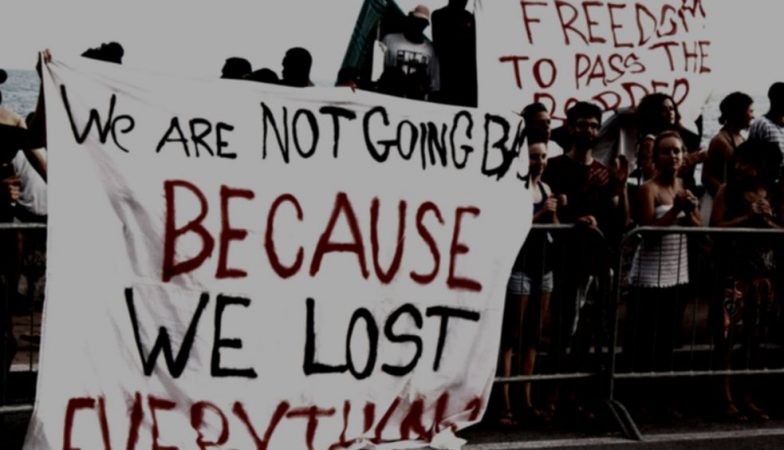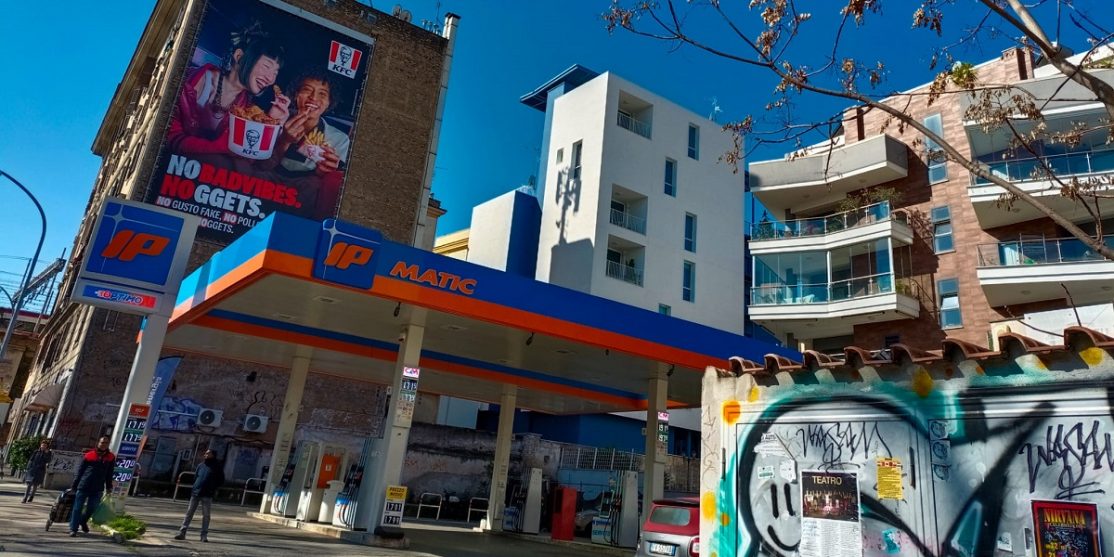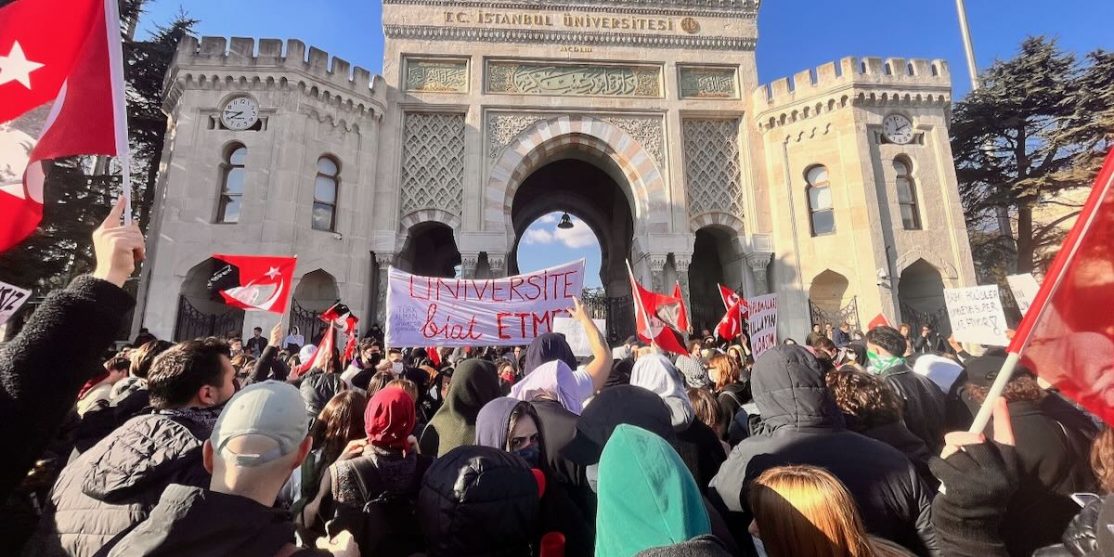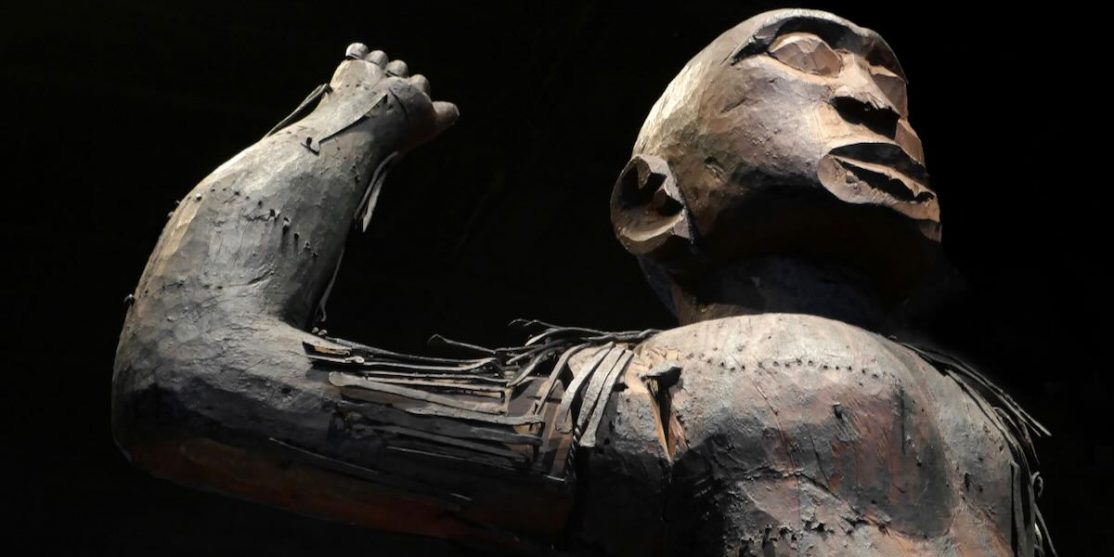DIRITTI
Ventimiglia everywhere

Since June 15th 2015, the ‘No Border Camp’ has been established by migrants and activists on the seafront between the cities of Ventimiglia and Menton, at the French-Italian border. Having been founded and maintained in a totally independent and self-organised fashion, it has since acquired rather impressive proportions: a kitchen providing more than 200 meals a day, toilets, showers, electric cables, and a now fully-operative press office.
Assemblies in English and Arabic are a daily habit in Ventimiglia. Among consistent discussion are number of key aspects of the common life inside the camp and its maintenance. Often symbolic demonstrations are organised at the border, which is only a few meters away from the camp, but at the same time represents a distant horizon for most migrants. In this atmosphere, actions such as blocking the traffic with the slogan “Open the border”, or deciding to swim from Italy to France (as around 35 between migrants and activists did on September 12th) have become part of the everyday life of the camp.
The No Border Camp is one of those places where people are not afraid of contradictions, where solidarity and common life literally wipe out every risk of a mere ‘humanitarian’ attitude. People live and struggle together, and often together undergo the violence of the european governance that chose to turn the borders into battle fields. The episodes that can be witnessed every day there often go beyond any realms of the imagination; these encounters are part of what we would define as an actual laboratory of police repression aimed at violently dealing with with the increasing flux of migrants. The tiny train station of Menton Garavan, the first to be reached on French soil, is always empty but for numerous squads of “Gendarmerie” ready to patrol every train to find and arrest migrants. The controls are quick and based exclusively on skin colour. The tension is permanent, as if something were to suddenly happen, at any time. The cops are ready to grab every escaping life, throw them in a jeep and send them back from where they came.
On the Italian side too, repression came quickly. As of today, we count 18 charges, 8 expulsion orders and two arrests against the activists of the camp. The confusion among police forces on the two sides of the border also contribute to an increase – if possible – regarding the precariousness of the situation. Migrants from sub-Saharan regions of Africa are at risk of immediate deportation when caught on French soil; nonetheless, most of the time they are simply kept packed in containers for hours and sent back to Italy. Inside the camp, is not unusual to meet people that attempted to cross the border, got arrested and were expelled from France.
Most of the people currently living inside the camp come from either Sudan or Eritrea. They escape from conflicts in Darfur and South Sudan, from the Eritrean regime, from the endless war in Somalia as well as from the menace of desertification. It’s really no surprise that these economical, political and environmental issues lead to migration fluxes that end in putting an increasing pressure on the border in Ventimiglia. The fact is that it is only recently we have noticed their power and began to pay attention to them. This is due to the post-2011 break-down of the network of controls, detention systems and deportations that Italy and the EU supported in Libya. Hundreds of thousands of migrants and refugees are already located in the area but the number of those who manage to move towards other countries crossing the desert and the Mediterranean sea towards Italy, France and beyond does not seem to be decreasing.
Ventimiglia is at the same time a fixed point and a stop-over for most of the people living in the camp. The border is nothing but one of the barriers to cross – only the first of many inside fortress Europe. The Calais jungle presents the next step for many.
Still, among many encounters and stops in such endless journeys, we think that in Ventimiglia some parts of the cruel mechanism of migration is cracking. Resistance, hope, and sharing every day life together are at work to snap the loneliness of the trip and of the quest for a better future. Every journey will still be long and different from the others. And indeed, not everyone will cross the hated border at the same time, and even on this side, there are evident and numerous differences. But at the same time, paradoxically, the mere standing in front of that border represents resisting lives and bodies – nobody shall call them refugees, nor migrants, nor any other name! Borders are already falling down in Ventimiglia. By that we mean artificial – or instrumental – categories imposed to the phenomenon of migrations. Smashing those borders, those categories, means wedging between the divisions of our stammering EU, now only capable to trench and to deploy police with an absurd violence at its borders. But it also means putting people’s lives in front of everything, even ahead of the interests of those countries – Germany first – that behind the humanitarian rhetoric are already organising the selection of a new working class.
Inside the camp we witnessed a totally horizontal mechanism, capable of continuously re-inventing its forms of organisation and going beyond every linguistic and ethnic barrier. But life is not limited inside the boundary of the camp – it flows out and screams to be heard. Collective demonstrations and symbolic actions, such as blocking the road to France are very common. What is worth stressing is how such a communicative and symbolic perspective is demanded by migrants themselves. On September 13th, for example, it was the migrants who decided to symbolically swim across the border together with international activists. Symbolically, for sure. But thinking twice, the search for media attention, or even representation, are naturally born among people living in front of a barrier – that closed border – which is physically closed but at the same time being a manifestly empty symbol. Then even symbolical initiatives open a field of higly-reproducible and effective political practice. In the same vein is what happened a few days ago at the Serbian-Hungarian border, when a few thousands migrants cut some parts of the fence built by Orban’s government. Border crossing becomes then an actual option or more, an inexorable process which is just beginning.
This duality of the border – a break in a longer journey and a place to stay as well as an intersection – raises the issue of building a network inside migrations. This could have multiple meanings: communicating with other people in Paris, Calais, or eastern Europe; providing detailed legal and logistic support around the continent; claiming together and in different regions the right to move. We believe in the absolute priority of finding common words and practices able to represent those paths towards freedom, against the walls of fortress Europe. Disobedience at the borders is becoming a common practice, an actual connection between different movements. The possibility of becoming a network arises through this kind of direct action, that takes place around fluxes of people being able to open spaces of resistance everywhere they gather, rather than remaining linked to a point in space.
Today, the borders of Hungary are burning, fences of barbed wire are raised at the gates of Europe. The border is becoming again a military zone, a physical barrier, in a desperate attempt to defend an identity leaning on already feeble roots. At the same time, thousands of other borders are raised every day: cultural borders, by those who wish for fragmented nations; borders of this who see migrations as a temporary, disconnected phenomenon rather than catching their global and historic aspects; borders among virtuous and lazy countries, among a severe and productive northern Europe and a parasitic, insolvent south. The humiliation of Greece juxtaposed with the selection of refugees allowed to enter are sides of the same coin: the blackmail of debt and of passports are born from the same “there is no alternative”.
“Ventimiglia everywhere” doesn’t simply sound as a slogan to us, rather it represents an actual possibility, a viable option to smash and cancel every border, a common name to different desires of freedom.




